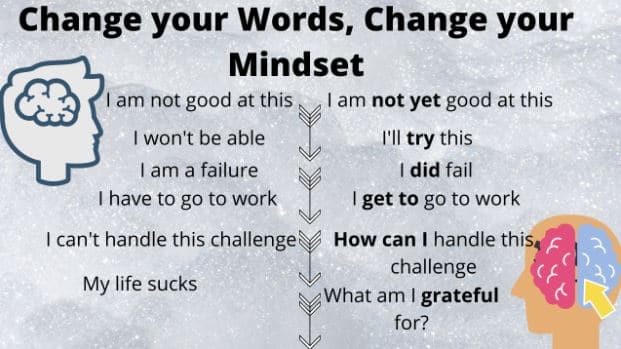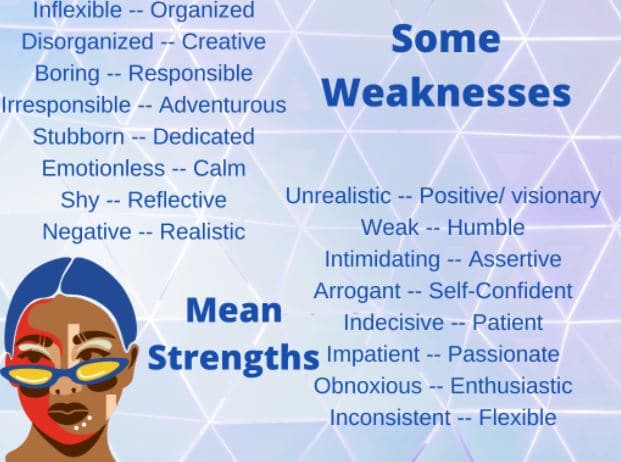Words are extremely powerful in shaping our lives.
In a neuroscience study named “Do Words Hurt?” scientists discovered that negative words promote stress-inducing hormones in their subjects.
But you can use the following ways to change your words to change your mindset and achieve success and happiness in your life.
Let’s dive right into it.

1. Change “I Am Not There” to “I Am Not Yet There”
You might be beating yourself up because your peers have something you don’t have. It might be a better job, marriage, yacht — you name it. And while some people will tell you to just let go of such thoughts, there’s a better way of combating this.
Replace the word “not” with “not yet.”
We all have different paths to the journey of life. Therefore, some people will get where you wish to be earlier than you. And that’s okay.
While “not” signals failure, “not yet” gives you hope. Saying you’re not yet where you want to be makes you remember your goals and strategies. And that’s what you need to succeed.
2. Rather Than “I Won’t Be Able” Say “I’ll Try”
“I won’t be able” is something people with a fixed mindset are used to saying. They are used to stepping back in whatever they think they’re not good at.
But talking about your inability to do something prevents you from exploring your limits. You’d be unable to start since you’re assuming you can’t make it no matter what.
But to develop a growth mindset, you have to constantly attempt any task relevant to your goals. You need to change your words to “I’ll try this” if you want to be successful in anything.
3. Use “I Do Bad Thing” Rather Than “I Am Bad Thing”
You’ll hear it all the time. People calling themselves failures, lazy, stupid, and all sorts of bad things. And you may have that habit as well.
But you should know that what you say you are, you become. This is because you’ll think whatever trait you have can’t be changed.
But when you say that you do something bad, your mind will be open to solutions.
In Michelle Obama’s book Becoming, she urges people to not brand themselves names like a failure. This way, you’ll be freeing yourself from limiting beliefs and know you can do better.
4. Use “I Get to” Instead of “I Have To”
When you feel like you have to do something, you experience some pressure that brings up negative emotions. That’s why it’s easy to procrastinate when you are faced with must-do chores.
However, if you’re talking about meeting with a new client you’ve been anticipating to get in business with, chances are, you’ll use “get to” in your statement. And that’ll spark interest since you’ll view the activity as an opportunity.
As you can see, applying “get to” where you’re used to inserting “have to” might be the best strategy for motivating yourself in your day to day pursuits.
5. Change “I Can’t” to “How Can I?”
One of the most used expressions when introducing self-limiting beliefs is “I can’t.” It prevents people from trying and kills many dreams. But when changed to a question, it can change lives.
Whenever a thought of inability to do something pops up, find a replacement instantly. Instead of saying:
- “I can’t be as smart as her,” ask yourself “How can I apply her strategies to achieve similar results”
- “I can’t reach the finals,” use “How can I make it to the finals?”
6. Instead of Calling It a Block, Call It a Test
Way Dyer, a renowned personal development speaker and author once said, “If you change the way you look at things, the things you look at change.” This quote reveals the power of changing perspective, which can be achieved by altering words.

You can apply this tactic when you encounter barriers hindering you from achieving your goals. Since block or barrier are words signaling extreme hardship, it’s best to use “test” instead.
Tests exist to be tackled. They prompt a search for solutions and hint at a promise to learn something that’ll take you to the next level.
7. Use “I’m Growing Through” Instead of “I’m Going Through”
All of us experience trying times at some point in life. Although they aren’t fun for anyone, you may get caught up in a stagnating victim mentality when you keep thinking and saying “I am going through tough times.”
However, a shift in the narrative can help you manage tough situations better.
When you think you’re growing through the experience, it’ll be easier to consider the silver lining. Furthermore, you can be more objective and pull through faster, coming out stronger than before.
Related: Is Talking To Yourself Bad? 16 Scientific Reasons Why It Isn’t
8. Change “I Am Not Enough” to a Question
When you keep thinking that you aren’t enough, those words will be reinforced to your subconscious. This way, no matter how many achievements, material things, or friends you collect, you’ll always feel inadequate.
However, challenging this perspective can help. You can alter “I’m not good enough” by asking yourself “Why do I think I’m not enough?”
Knowing why you always feel inadequate will help you change your mindset for the better. You can also use Marisa Peer’s free I Am Enough Masterclass to boost your self-confidence in streamlined steps.
9. Turn “He’s Better Than Me” to “How Can I Be My Best Self?”
No matter your achievements so far, it’s easy to fall into the trap of thinking someone else is better than you. This might grow into an obsession with comparing yourself to others.
However, the only better you need to be is your best self.
You don’t need to succumb to measuring up to standards so you can feel happy or successful. You are enough as you are and consistently trying to be better in sectors that matter to you is what you require to change your mindset positively.
10. Rephrase Your Weaknesses
Acknowledging weaknesses you have helps you grow. But you can do more by using terms that alter your flaws to bring a positive perspective.
In his article How To Turn Your Weaknesses To Strengths, David Kerpen introduced another strategy to use words to shift your mindset.
You can let this list of words change your mindset about your flaws:

11. Turn “This Is Too Hard” to “This May Take Some Time”
When we perceive that something is too hard, we may procrastinate or give up doing it altogether. However, the solution isn’t saying that it’s easy either.
You can say, “This may take some time to do, adjust, prepare…” and you’ll be willing to put in your best effort.
Whatever your case, it may be challenging but you can do it. It may take some time to do what you need to but you can still get it over with.
12. Replace “I Am Only” With “I Can Be More”
“I am only a junior sales representative.” “I am only good at this job.” “I am only capable of acquiring an entry-level job.” The list of the statements people use to belittle themselves using “I am only” is limitless. And they promote mediocrity.
If you’re one of the people using those terms frequently, you should change those words to enhance a growth mindset.
Instead, use “I can be more” statements to introduce how you can get there. For instance, “I can attain a senior position in any company by getting a master’s degree.”
13. Turn “Nothing Works for Me” to “I’ll Find What Works for Me”
In contrast to what people think, not all strategies bring the same results for different people.
For instance, you might try all the 5-minute productivity hacks on the internet, use routines of successful people, and even buy a book on productivity but still fail to fix your unproductive habits.
But even then, Steve Jobs urges you to find what works for you with his quote, “If you haven’t found it yet, keep looking.”
Don’t settle for less by saying nothing works for you. When you change your words and continue your search, you might find answers.
14. Shift From “It’ll Be Bad” to “It Might Be Good”
People with a growth mindset don’t always think negatively of the unknown. Neither do they try to shape it in a black or white paradigm. They are open to possibilities but keep a positive perspective close.
Therefore, instead of saying “I won’t make it,” say, “I might make it.” As you can see, the second statement doesn’t declare certainty where there’s none but it provides hope.
The following video about changing your reality by changing your beliefs explains this concept more:
15. Change “How Will They View Me” to “How Will I View Me”
One of the fundamentals of the growth mindset is having the success that you genuinely desire. Not what others view as success.
Therefore, another way words change your mindset is by using “I” rather than “they, her, and him” when thinking about the way you wish people to view you.
Your core values should be what pushes you to do anything you do. This way, you can live your purpose, not succumbing to the pressures of who you should be through other people’s eyes.
16. Replace “Failure” With “Lesson”
Apart from John Maxwell’s advice in his best selling book Failing Forward, many world successes promote learning from failure as the only way to achieve success. Yet many people avoid it like a plague.
Failure is bound to happen when you’re doing the work. However, focusing less on the word and more on the lessons learned will help you move forward faster and stronger than before.
Every time you think about your failures, shift your concentration to the insights you got when you were trying to move forward.
17. Turn “My Life Sucks” to “What Can I Be Thankful For?”
When you feel like life has drained happiness from you, it’s easy to exclaim “My life sucks.” But this statement doesn’t make it any better. In fact, it worsens your feelings.
There’s nothing the good old gratitude can’t solve though. In a study led by Joshua Brown and Joel Wong of Indiana University, it was revealed that gratitude can bring long-lasting happiness.
Therefore, instead of making negative remarks about your life, ask yourself what you’re thankful for.
Final Word
You can transform your mindset by changing your narrative. It won’t happen overnight though. You have to consistently use better terms when thinking and talking.
Which words would you use to change your mindset? Tell us in the comment section. And don’t forget to share if you loved this piece!
Related Posts
31 Types Of Coaching – A Complete List
Happiness Coach – Top 13 Valuable Facts Checklist
